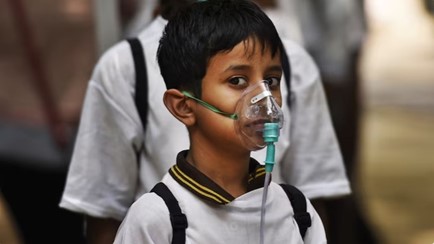
Air pollution in India, particularly in major cities like Delhi, is not only taking a severe toll on public health but also inflicting significant financial costs on individuals and the economy, according to a recent study published in The Lancet Planetary Health journal.
The research, which analysed data from 2008 to 2019, reveals that approximately 7.2% of all deaths in India can be attributed to daily exposure to PM2.5, fine particulate matter that poses serious health risks.
Delhi, long considered one of the world's most polluted cities, recorded the highest number of pollution-related deaths at 12,000 per year during the study period.
The financial implications of this pollution crisis are staggering. The study indicates that in India, PM2.5 concentration increased health costs per capita by $40, baseline mortality by $38, and source structure by $34.
These figures points to the hidden economic burden that air pollution places on individuals and families, often in the form of increased medical expenses and lost productivity.
The health impacts of air pollution are wide-ranging and costly. Respiratory diseases, cardiovascular problems, and even cognitive impairments have been linked to prolonged exposure to high levels of PM2.5.
Children are particularly vulnerable, with many experiencing respiratory issues, reduced lung function, and increased school absences due to pollution-related illnesses.
Moreover, the study suggests that the economic toll extends beyond direct health costs. Reduced visibility due to smog can disrupt transportation and commerce, while the degradation of air quality can deter tourism and investment in affected areas.
The findings emphasise the urgent need for comprehensive action to address air pollution in India.
Reducing PM2.5 levels, improving public health measures, and eliminating combustion sources could substantially decrease per capita health costs. This approach would not only save lives but also alleviate the financial burden on individuals and the healthcare system.
As India grapples with this dual health and economic challenge, policymakers are under increasing pressure to implement stricter environmental
regulations, promote cleaner energy sources, and invest in sustainable urban planning.
The study's revelations serve as a stark reminder that the cost of inaction on air pollution far outweighs the investments required to create cleaner, healthier cities for all Indians.
Source: İndia Today – URL: https://www.indiatoday.in/environment/story/delhi-air-pollution-death-health-cost-finance-economic-2562735-2024-07-05